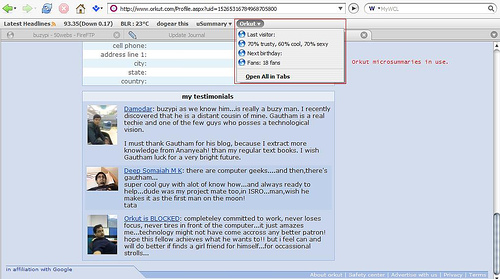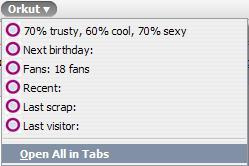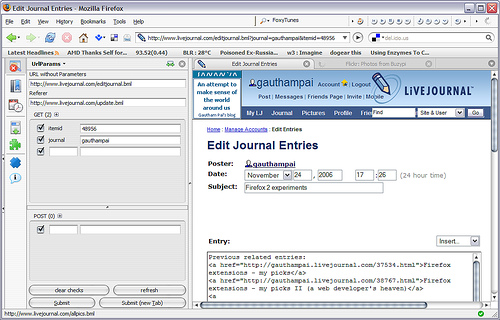Here comes the press release. IBM released an EPCglobal standards compliant product called WebSphere RFID Information Center.
Here are some more links:
Here comes the press release. IBM released an EPCglobal standards compliant product called WebSphere RFID Information Center.
Here are some more links:
I wrote some simple micro-summary generators for Orkut. Here is what each one does:
Last visitor: If profile visit is enabled, this micro-summary will tell you who visited your profile last.
Karma: This indicates your 3 karma values.
Next birthday: This indicates whose birthday is next.
Fans: This indicates the number of fans you have.
Here are the micro-summary generators.

In order to learn more about microsummaries click here. I will describe the steps below for using my orkut microsummary generators.
1. Install all the generators from the link given above.
2. Go to Orkut home.
3. Click on Bookmarks -> Bookmark this page.
4. In the Name option, click on the drop down menu. You should see the microsummaries in action. Select one and click OK.
5. Repeat steps 3 and 4 for each of the microsummaries.
6. For the karma microsummary, go to your profile page and repeat steps 3 and 4.

(Please note: Some values have been deliberately removed.)
The fun is it is live, which means any changes are almost instantaneously reflected.
A long time back in the dense forests of WonderLand, 'people' decided to create a multi core 'processor'. For those who don't know what that is, a multi-core processor contains more than one processor packaged together as a single unit. Computation can then be shared between these processors and the result assimilated.
Now think of these 'people' to be the ones who designed the human brain and the 'processors' to be human beings. Does that remind you of H2G2 or the Matrix? May be.
Ok, now what would multi-core mean in this case? Computation shared between people? Well, how about you calling someone to ask him, which movie you went to last Sunday because you forgot that name? May be.
Ok let's exaggerate this a little more. I am not a technical astrologer, but soon a time will come when your information will be stored across multiple things (both living and non-living) and you just make a mental picture of who has what, or what has what. How many of us now rely on our mental abilities for simple things like addition of a list of numbers? How about your dad's mobile number? Or how about the site where you downloaded that music track? How about your best friend's birthday? Or calling up your friend to ask him which company your other friend is working in. Or the day you bought your bike? The list continues…
Hey! Did I really blog this. Forget what I said, I was asleep.
Previous related entries:
Firefox extensions – my picks
Firefox extensions – my picks II (a web developer's heaven)
Microsummaries – a new feature in Firefox 2
Firefox 2 was released recently. This week I got a chance to dabble with it. Integrated spell-check is a new feature that I liked.
I cannot stop talking about Microsummaries. So I continued my experiments and I found some useful extensions.
Here they are:
Microsummary Generator Builder
XPath Checker
Also for Web developers, here are some more useful extensions (other than the ones that I have mentioned in my previous blogs)
Also I found these extensions very useful:
All-in-One Sidebar
So here's how it looks now:

The last 2-3 months has been very busy and I have almost lost touch of what's going on in my interest fields.
My reader is filled up and I will surely not be able to catch up with the load.
As a co-incidence, I came across this site, Knowledge Web. I listened to a podcast on knowledge where James Burke, who's the brain behind this idea was interviewed. It's a very interesting idea and let me try to describe it below.
The amount of information/knowledge in the world has increased so much that this is creating new kinds of problems. While on one side are problems like Continuous Partial Attention, on the other end are other humanitarian problems.
This is the line that caught me most:
“People tend to become experts in highly specialized fields, learning more and more about less and less.”
Wow! People say, “I consider myself an expert in component A of product B on platform Z”. Everyone is an expert if we think about it.
The problem with this is people become ignorant of the progress in other branches. Re-invention of the wheel is inevitable. It's always a good idea to know as much about diverse fields as possible. James encourages people to look at other fields (totally unrelated to your present field) and learn that the knowledge of the whole world is connected. In fact, in the podcast he describes how people (who form the vertices of a graph) are connected with events (as edges) and you can move from any event to any event by traveling in this graph, which he calls the Knowledge Web.
Now think about what that means. You have a way of connecting the incident that Gandhiji was killed with the invention of the computer, or any thing like that.
James then describes how the present education system is outdated and what needs to be done to revive it.
So do this. Read/Learn about something that is totally unrelated to what you do for a living and see what that has in store for you. Learn about arts, history, philosophy, chemistry or whatever you can think of and see what is the hot thing in their field and soon you will see how the world is all related!
| I had been to Paramount Great America Amusement park today. |

|
I am right now in my hotel room in San Jose, California.
This is a business visit for a duration of 2 weeks.
I reached here on Monday afternoon after a long and tiring journey that lasted for more than 24 hours. We took Singapore airlines and came via Singapore/Seoul.
My first impression of this city:
Well, for a person like me who has been in India all his life, there are some major differences you see here. You hardly get to see people on the street. Places are too far apart from each other and it seems like car manufacturing is a booming business!
You hardly get to see anything other than cars and trucks.
The office is quite close to the hotel and it is about a 10 min drive.
Use of technology:
I have seen some wonderful use of technology right since I left Bangalore. For example, Singapore airlines has a small screen for every passenger, where you get to watch movies, listen to music and play games. The remote doubles as a WiFi phone. It has a card reader to activate the phone.
One of the channels shows real time information about the flight, including altitude, temperature, time in destination and present position, and a map showing the current position of the plane. Whenever you see some mountains, you look out of the window and you actually get to see the mountain tops. You also realize why the plane is changing direction and in which direction it is heading.
I also saw the cab driver using GPS to reach the hotel. He just entered the destination address and the map showed him the direction he had to take.
A lot of things to learn and take note of!
Bruce Schneier said, “In order to become a cryptographer, you need to be a cryptanalyst.[1]”
Now is there a person better than Frank Abagnale to prove this? I watched the movie, Catch me if you can and was quite impressed by this person. It was hard to believe that this is a true story. A web search convinced me.
While browsing through the Wikipedia external links, I hit upon this article in BBC about Frank and this reminded me of the blog entry that I had made related to identity management and privacy issues.